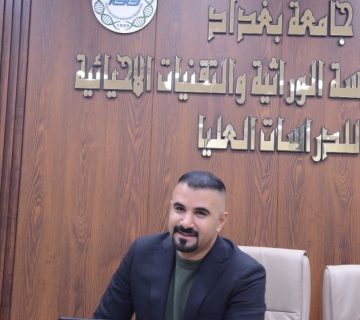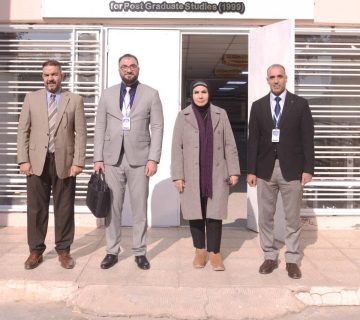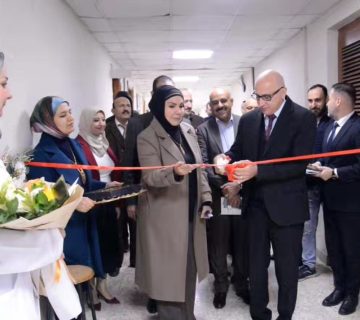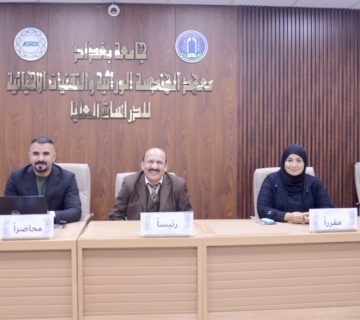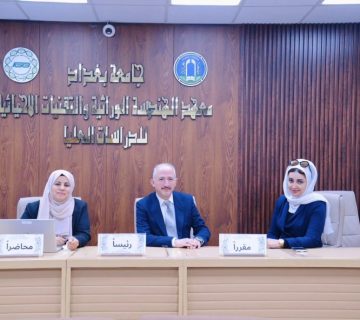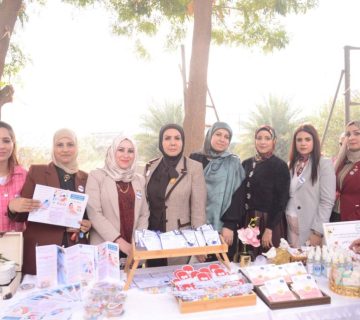– Reading is an essential part of my life… My father always encouraged me to excel and succeed.
– I am very optimistic about Professor Dr. Salwa Jaber Al-Awadi’s leadership of the institute.
Supervision: Dr. Rami Ali Taqi
Preparation & Interview: Rand Qusay Majid
Editing: Ahmed Mohammed Zameem
Photography: Moan Rabee Abbas
Her passion for science began at a young age. Encouraged by her parents, especially her father, she always aimed to be at the forefront of academic success. She has obtained patents that gained widespread recognition among Iraqi scientists.
She is known for offering guidance, particularly to her students—over 100 graduates have learned under her supervision. She deeply cares about their future.
She expresses great optimism about the current administration of the Institute of Genetic Engineering, led by Professor Dr. Salwa Jaber Al-Awadi, whom she describes as highly capable of achieving new successes that will add to the institute’s legacy.
She is Professor Dr. Amina Neama Al-Thuwaini, the third dean in the history of the Institute of Genetic Engineering at the University of Baghdad—our guest in Shatharat, where we share her inspiring success story.
When did your passion for science begin, and how strong was your enthusiasm for it?
Dr. Al-Thuwaini recalls, “As a child, I was always curious about conducting experiments and often wondered if human food could be prepared in the form of pills. I thought the time spent eating was wasted.”
She adds, “I come from an academic family. My father loved science, excellence, and success, and he was my biggest supporter. This motivated me to always strive to be the best and give my utmost effort in all stages of my education.”
Tell us about your university years and how your journey began.
Dr. Al-Thuwaini explains, “I was accepted into the College of Veterinary Medicine at the University of Baghdad, which was then known as the ‘Professorial College’ because most of its faculty members held the title of professor. I loved the college and was deeply attached to it. I graduated top of my class and was appointed as a teaching assistant only 40 days after graduation.”
Did any professor change your academic perspective?
She responds, “Yes, my professor in the third year, Dr. Ihsan Al-Saqr, who later became my husband, encouraged me academically. He provided me with scientific books and strongly supported my education, just as my father had. Students at the College of Veterinary Medicine were like a family, always helping each other.”
She continues, “After completing my undergraduate studies, I aspired to continue my education abroad. However, due to the country’s circumstances, scholarships were suspended, so I pursued my master’s degree in Iraq in 1987, followed by my PhD under the supervision of Dr. Farouq Al-Aqeedi, whom I consider a mentor and role model.”
“With the halt of foreign scholarships, PhD studies were established in Iraq for the first time. I was part of the first PhD class in Veterinary Medicine, as I ranked first in my master’s program, obtaining my PhD in 1995.”
“This strengthened my sense of belonging to my institution, where I worked for 21 years (1979-2000) before transferring to the Institute of Genetic Engineering and Biotechnology in 2000. At that time, the institute was newly established, lacking a teaching staff. My specialty in genetic immunity and medical microbiology made my transfer essential, facilitated by Dr. Ali Al-Zaaq and Professor Dr. Salwa Jaber Al-Awadi.”
What does it mean to you to have served as the dean of the Institute of Genetic Engineering?
“In 2007, I was officially appointed as the dean of the institute, succeeding Dr. Nahiya Abdul-Hussein. I remained in this role until 2013. This period was a true challenge due to the unstable security conditions in the country.”
“Despite these difficulties, I was always optimistic about developing and advancing the institute. I remain hopeful under the leadership of young faculty members, including Assistant Professor Dr. Saif Dawood Al-Ahmar and the current dean, Professor Dr. Salwa Jaber Al-Awadi.”
How did you approach your leadership at the institute?
Dr. Al-Thuwaini describes her administrative approach as having two key aspects:
-
Enhancing the scientific level by developing curricula, laboratories, and encouraging faculty and students to participate in seminars, workshops, and international events. Under her leadership, the institute held three scientific conferences in 2008, 2009, and 2011, in addition to over 10 scientific seminars in various fields.
-
Time management and teamwork, ensuring productivity while maintaining a flexible and supportive environment for faculty, staff, and students. She emphasizes, “Despite the hardships and security issues, I remained close to everyone—students, employees, and professors. The atmosphere was always filled with optimism and camaraderie.”
How have 45 years in academia affected your personal life?
She reflects, “These years taught me patience, resilience, fairness, and thoughtful decision-making. I learned to respect time, plan effectively, and complete tasks without procrastination. I believe that is the key to success.”
What does reading mean to you?
She answers, “Reading is an essential part of my life. It broadens one’s knowledge, allowing me to learn a little about everything. I particularly enjoy history and immunology books, as they relate to health and my field of expertise.”
Have you obtained any patents?
Dr. Al-Thuwaini proudly shares, “I have several patents, including one for the treatment of ‘Baghdad Boil’ (Cutaneous Leishmaniasis). I also have two patents currently in progress.”
How many students have graduated under your supervision?
She states, “I have supervised over 100 students at various levels—PhD, master’s, and higher diploma. Many of them have excelled in their careers, including:
- Professor Dr. Salwa Al-Awadi, the current dean of the institute.
- Dr. Ismail Hussein, former assistant dean.
- Dr. Zuhair Gedoun, Vice President of the University of Karbala.
- Dr. Mohammed Nashmi, Director of the Forensic Medicine Unit.
- Several graduates who have become parliament members, general directors, and deans at various Iraqi universities.
Additionally, she has authored four published scientific books, with two more in progress, and has over 200 research papers published locally and internationally.
What advice would you give to students?
She advises, “Never stop striving for excellence. Success is achievable for anyone, but true distinction comes from pushing boundaries and keeping up with scientific advancements. Learning is a lifelong journey.”
Before we conclude, would you share a favorite line of poetry?
She smiles and recites a verse by Abu Alaa Al-Ma’arri:
“We walked paths that were written for us, and whom it was written for shall walk it.”




